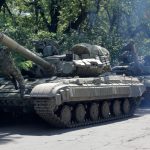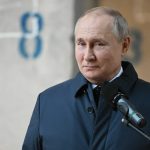
Josh Marshall
One feature of this almost two-week conflict between Russia and Ukraine is that civilians actually have access to lots of military information. Through open source intelligence, on the ground reporting and more we’re getting lots of details about battlefield losses of armor and aircraft, lines of control, shelling, ground movements, civilian and military casualties and more. But for most of us it’s pretty hard to know what these things mean. For instance, presumably it’s bad news for Russia if a couple of their planes get shot down. But are those expected combat losses or does it tell us something meaningful about the progress of the conflict? This is particularly important since Ukraine and its advocates are flooding social media with pictures of destroyed armor and downed airplanes. That makes total sense. They’re trying to maintain national morale and demonstrate their fighting capacity both to allies and to the Russian public. But assuming the photos are genuine, what do they mean? To help myself with this I’ve created the beginnings of a Twitter list specifically made up of military analysts. You can follow it here.
This new list is different from the one I’ve assembled for following the Russia/Ukraine Crisis in general. It only has a few members so far since this new list is focused on a very rarefied class of people: knowledgable military analysts with a special focus on NATO, Russia, Eastern Europe, the Russian “near abroad” etc. who are also prolific on Twitter. But I will be adding to it and would invite any suggestions.
 Among the Mil Nerds
Among the Mil Nerds 
Though it is generally out of view for those of us who don’t live in that world, the world’s militaries maintain a universe of think tanks and war colleges to study all aspects of war. Some of this work is conducted by men and women in uniform and hidden behind walls of classification and secrecy. But quite a lot of it, probably most, is done by civilian researchers and academics with a lot of it available to the public, if not widely read. Last week I mentioned following the Twitter feed of Michael Kofman, an expert on the Russian military at one of the top national security think tanks funded and run on behalf of the U.S. Navy and Marine corps. But there’s a whole world of such researchers working either adjacent to or on behalf of various national militaries. You can read a lot of what they write and many are following developments in Ukraine with their Twitter feeds.
Read More
In a new article in Foreign Affairs, Liana Fix and Michael Kimmage explain how even if Russia loses its war in Ukraine, the international outlook that creates is a dark one. Far better than it winning. But still very dark. Looking to a post-Ukraine war world order, the authors write: “History has shown that it is immensely difficult to build a stable international order with a revanchist, humiliated power near its center, especially one of the size and weight of Russia.”
Read More Is Russia Being ‘Canceled’?
Is Russia Being ‘Canceled’? 
I spent the morning planning to write a version of this post when I saw a quote from Russia’s head of foreign intelligence that made me think there was perhaps more here than I’d even suspected. Sergei Naryshkin said today: “The masks are off. The West isn’t simply trying to close off Russia behind a new iron curtain. This is about an attempt to ruin our government — to ‘cancel’ it, as they now say in ‘tolerant’ liberal-fascist circles.”
Now, on its face this is more than a bit much. Russia is in the process of trying to erase another country from the map, in effect if not through formal annexation. That seems like the more relevant meaning of ‘canceling’ in this context. This is also a reminder of the confluence of discourses between the American revanchist right (Trumpism and its earlier monikers, essentially) and Russian state revisionism. One thing we are constantly and rightly reminded of in these moments is that people in other countries, Russia in this case, understand the world very differently than we do. And yet here they are using language that is in fact quite familiar. It doesn’t seem alien at all. There’s a rhetorical symbiosis between the two worlds. Some of this was driven by the 2015–16 Russian interference campaign. But at a deeper level that symbiosis was the foundation on which that interference campaign became possible. Just as the democratic civic world has some elements of a transnational common political language, the authoritarian, revisionist international does too.
Read More
Yesterday, as you no doubt saw, the UN General Assembly voted overwhelmingly to denounce Russia’s invasion of Ukraine. 141 countries voted for the resolution. The 5 who voted against it were an unsurprising list: Russia, two countries Russia essentially owns (Belarus and Syria), another country opposed to any sanctions against bad regimes (North Korea) and Eritrea. The really interesting list though was the 35 abstainers. That list looks like a view into the future, in part because the bulk of the countries abstaining looked less like they were seeking to avoid criticism of Russia than they were following the diplomatic lead of China — the most prominent abstainer on the list.
Read More
I’ve mentioned this a few times already. But I remain stunned at the number of people I’m generally used to seeing decrying “forever wars” and the military industrial complex insisting the time has come for us to intervene militarily in Ukraine. The favored demand seems to be a “no fly zone” either over Kyiv or the entirety of Ukraine — which in case you haven’t reviewed the maps is a very large country. The preference for “no fly zones” is itself a reminder that the U.S. public has virtually no living memory of war with a peer military force or even one that can put up any kind of fight. The word gets tossed around as though it described a kind of high tech forcefield the U.S. deploys when we’ve gotten fed up with the pictures we’re seeing on TV. I’ve even seen people questioning whether a “no fly zone” actually constitutes an act of war.
Read More
There’s one point I want to re-emphasize though it may sound a discordant note. In wartime communications even the good guys lie. Indeed, there’s at least some argument that wartime deception is a component of warfare itself. But the point is, governments and armies lie — especially when their backs are against the wall. The chaos and confusion of war also create erroneous reports. Sometimes the two intertwine. So while most of the claims we see coming out of the Russian side are downright Orwellian, we shouldn’t assume that all the claims we’re hearing from the Ukrainian side will bear out.
Read More
Twitter is chock full of hyperbole, ignorance and deception. But one of its special qualities is that if you take some care and follow some basic rules you can find people who you can actually learn quite a lot from. They’re out there. And during chaotic and fast-moving news events you can learn a lot from them. One of those people is Michael Kofman, who is one of the people on my list of people to follow to keep track of developments in the Ukraine Crisis. Among other things he’s the Director of the Russia Studies program at the Center for Naval Analyses, the main Navy/Marines think tank in Washington, DC. His opinions may be right or wrong. But given the Navy’s/Marine Corps’ interest in keeping tabs on the Russian military we can be confident he’s highly knowledgable about that topic specifically. I’ve been following his commentary over the last week or so and yesterday he posted a lengthy Twitter thread about what we’ve seen over the last three days.
Read More Should We Be Surprised US Intelligence Got It Right?
Should We Be Surprised US Intelligence Got It Right? 
I wanted to address a few points that have come up in discussions about the Ukraine Crisis in recent days and which John mentions below. I’ll start with the question of U.S. intelligence estimates about an imminent Russian invasion which appear to have been very accurate both in the overall prediction and the specifics of how one would take place.
I’ve seen a number of people say this was a surprise or at least not a given because of the intelligence failure that preceded the invasion of Iraq in 2003.
But I view this very differently.
Read More Sea Change
Sea Change 
A number of you have asked me, where’s President Biden? Why aren’t we seeing him on TV? Note that he has a State of the Union address coming up which will provide an extremely high profile setting. But the real reason is almost certainly that the U.S. administration wants to have Europeans taking the most visible role announcing new sets of sanctions. I suspect they also want to avoid taking the bait of President Putin’s nuclear saber-rattling. Reports suggest that — wisely and unsurprisingly — President Biden has chosen not to match Russia’s nuclear forces alert status. First, there’s no need to. Our strategic nuclear forces are already on plenty of alert to manage the unthinkable. There’s no need for that kind of tit for tat escalation. We also don’t need competing press availabilities.
With all this said, though, there’s clearly something more happening here than just allowing Europe to take the lead in announcing measures the U.S. was trying to persuade them to take. There’s also clearly a sea change, both in the willingness to contemplate crippling economic sanctions as well as to openly arm the Ukrainian army.
Read More